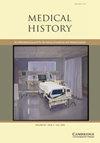在前脑中发现ruh: Mazhar Osman和新兴的土耳其精神病学话语
IF 0.9
2区 哲学
Q4 HEALTH CARE SCIENCES & SERVICES
引用次数: 0
摘要
本文考察了土耳其共和国早期(1923-1950)在伊斯兰文化背景下,现代精神病学话语的出现。为了做到这一点,它将重点放在Mazhar Osman [Uzman](1884-1951)的精神病学出版物上,他是公认的现代土耳其精神病学之父;并旨在从系谱上追溯他对ruh重新概念化的科学项目,ruh是一个阿拉伯-土耳其概念,主要指的是超验灵魂,在生物学描述精神病学的框架内从生理学上呈现它。因此,这篇文章论述了在土耳其出现的难以捉摸和多层次的精神病学语言,这是现代精神病学介入一个以前由宗教和土著传统定义的领域的结果。试图将共和精神病学话语置于产生它的文化和社会政治环境中,本文阐明了Mazhar Osman传播的新精神病学知识是如何在与宗教或传统话语的构成对比中形成的,明确地将它们与奥斯曼帝国的过去及其所谓的落后联系起来,因此与现代土耳其国家建设的凯末尔主义项目产生了共鸣。此外,通过关注土耳其精神病学语言的复杂性及其引发的争论,本文旨在反思土耳其精神病学语言曾经(大概现在仍然)被早期形式的伊斯兰知识和传统所困扰的方式,尽管现代精神病学以及现代世俗国家系统和权威地试图永远抹去它们。本文章由计算机程序翻译,如有差异,请以英文原文为准。
Finding ruh in the forebrain: Mazhar Osman and the emerging Turkish psychiatric discourse
Abstract This article examines the emergence of modern psychiatric discourse under the culturally Islamic yet radically secular context of the early Turkish republic (1923-1950). To do so, it focuses on the psychiatric publications of Mazhar Osman [Uzman] (1884-1951), the widely acknowledged “father” of modern Turkish psychiatry; and aims to genealogically trace his scientific project of reconceptualizing ruh, an Arabo-Turkish concept that predominantly refers to transcendental soul, rendering it physiologically within the framework of biological-descriptive psychiatry. The article consequently addresses the elusive and multilayered psychiatric language emerged in Turkey as a result of modern psychiatry’s interventions into a field that was previously defined by religion and indigenous traditions. Attempting to contextualize republican psychiatric discourse within the cultural and socio-political circumstances that has produced it, the article sheds light on how the new psychiatric knowledge propagated by Mazhar Osman was formulated in constitutive contradistinction to religious or traditional discourses, explicitly associating them with the Ottoman past and its alleged backwardness, hence reverberating with the Kemalist project of modern Turkish state building. Furthermore, by focusing on the complexities of the Turkish psychiatric language and the contestations it has generated, the article aims to reflect on the ways in which the Turkish psychiatric language was (and presumably still is) haunted by earlier forms of Islamic knowledge and traditions, despite modern psychiatry’s as well as modern secular state’s systematic and authoritative attempts to erase them for good.
求助全文
通过发布文献求助,成功后即可免费获取论文全文。
去求助
来源期刊

Medical History
医学-科学史与科学哲学
CiteScore
1.60
自引率
0.00%
发文量
25
审稿时长
>12 weeks
期刊介绍:
Medical History is a refereed journal devoted to all aspects of the history of medicine and health, with the goal of broadening and deepening the understanding of the field, in the widest sense, by historical studies of the highest quality. It is also the journal of the European Association for the History of Medicine and Health. The membership of the Editorial Board, which includes senior members of the EAHMH, reflects the commitment to the finest international standards in refereeing of submitted papers and the reviewing of books. The journal publishes in English, but welcomes submissions from scholars for whom English is not a first language; language and copy-editing assistance will be provided wherever possible.
 求助内容:
求助内容: 应助结果提醒方式:
应助结果提醒方式:


